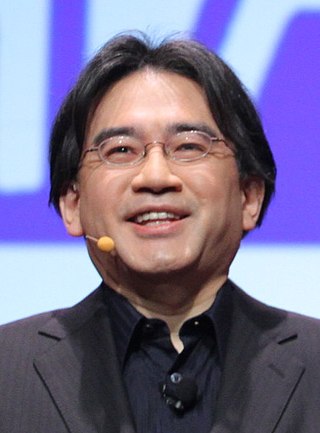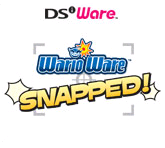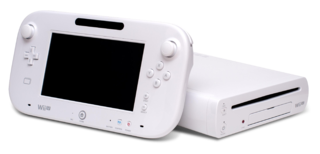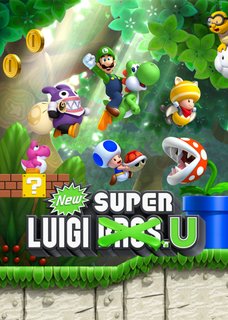Related Research Articles

The Wii is a home video game console developed and marketed by Nintendo. It was released on November 19, 2006, in North America and in December 2006 for most other regions of the world. It is Nintendo's fifth major home game console, following the GameCube and is a seventh-generation console alongside Microsoft's Xbox 360 and Sony's PlayStation 3.
Ken Sugimori is a Japanese video game designer, illustrator, manga artist, and director. He is best known as the primary character designer and art director for the Pokémon franchise. Sugimori is also credited with the art direction for other titles, including Pulseman. Sugimori drew and finalized all of the original 151 Pokémon. He has also worked on the various Pokémon films, trading cards, and other games like the Super Smash Bros. series.

Pokémon Snap is a 1999 first-person photography game with rail shooter style gameplay mechanics developed by HAL Laboratory and published by Nintendo for the Nintendo 64. It was first released in Japan in March 1999 and was later released in July 1999 in North America and in September 2000 for PAL regions. It is a spin-off game in the Pokémon series, being one of the first console-based games for it, and featuring many Pokémon rendered for the first time in real-time 3D. The game was re-released for the Wii's Virtual Console in December 2007, for the Wii U's Virtual Console in 2016, and for the Nintendo Switch Online + Expansion Pack in June 2022.

Satoru Iwata was a Japanese businessman, video game programmer, video game designer, and producer. He was the fourth president and chief executive officer (CEO) of Nintendo from 2002 until his death in 2015. He was a major contributor in broadening the appeal of video games by focusing on novel and entertaining games rather than top-of-the-line hardware.

Adventures of Lolo is a puzzle video game released in 1989 by HAL Laboratory for the Nintendo Entertainment System. It is a compilation of puzzles from Eggerland: Meikyū no Fukkatsu and Eggerland: Sōzō he no Tabidachi. It is the fifth game in the Eggerland series, the third one released in Europe, but the first one released in North America. It was available on the Wii's and Wii U's Virtual Console in North America and in PAL regions, as well as on the Nintendo Switch Online's virtual Nintendo Entertainment System library.

Donkey Kong Jr. Math is an edutainment platform video game developed and published by Nintendo for the Nintendo Entertainment System. It is a spin-off of the 1982 arcade game Donkey Kong Jr. In the game, players control Donkey Kong Jr. as he solves math problems set up by his father Donkey Kong. It was released in Japan in 1983 for the Family Computer, and in North America and the PAL region in 1986.

Nintendo Research & Development No. 1 Department, commonly abbreviated as Nintendo R&D1, was Nintendo's oldest video game development team. It was known as Nintendo Research & Development Department before splitting in 1978. Its creation coincided with Nintendo's entry into the video game industry, and the original R&D1 was headed by Gunpei Yokoi. The developer has created several notable Nintendo series such as Metroid, Mario Bros. and Donkey Kong.

Golf is a golf-based sports simulation video game developed and released by Nintendo in 1984 for the Famicom in Japan. Later the same year, it was ported to the Nintendo VS. System as VS. Golf or Stroke and Match Golf, released in arcades internationally, followed by another arcade version called VS. Ladies Golf. The original was re-released for the NES in North America in 1985, and for the Famicom Disk System in 1986 in Japan.

Wii Sports is a 2006 sports simulation video game developed and published by Nintendo for the Wii video game console. The 1.0 (pre-release) version of the game was released in North America along with the Wii on November 19, 2006, and the 1.1 version was released in Japan, Australia, and Europe the following month. Nintendo then changed to selling the 1.1 version in North America a couple months later. It was included as a pack-in game with the console in all territories except Japan, making it the first sports game included with the launch of a Nintendo system since Mario's Tennis for the Virtual Boy in 1995. The game is available on its own as part of the Nintendo Selects collection of games.

Link's Crossbow Training is a 2007 shooting video game developed and published by Nintendo for the Wii video game console. It was bundled with the Wii Zapper peripheral and was the first title to use it. The game was released worldwide in 2007, and in Japan in May 2008. It uses several environments, enemies, and other assets from The Legend of Zelda: Twilight Princess as stages for targets with various shootable background objects.
Downloadable content (DLC) is additional content created for an already released video game, distributed through the Internet by the game's publisher. It can either be added for no extra cost or it can be a form of video game monetization, enabling the publisher to gain additional revenue from a title after it has been purchased, often using some type of microtransaction system.

The Nintendo DSi is a dual-screen handheld game console released by Nintendo. The console launched in Japan on November 1, 2008, and worldwide beginning in April 2009. It is the third iteration of the Nintendo DS, and its primary market rival is Sony's PlayStation Portable (PSP). The fourth iteration, entitled Nintendo DSi XL, is a larger model that launched in Japan on November 21, 2009, and worldwide beginning in March 2010. Development of the DSi began in late 2006, and the handheld was unveiled during an October 2008 Nintendo conference in Tokyo. Consumer demand convinced Nintendo to produce a slimmer handheld with larger screens than the DS Lite. Consequently, Nintendo removed the Game Boy Advance (GBA) cartridge slot to improve portability without sacrificing durability.

WarioWare: Snapped! is a minigame compilation party video game developed by Nintendo SPD Group No.1 and Intelligent Systems and published by Nintendo for the Nintendo DSi's DSiWare digital distribution service, and is part of the WarioWare series of video games. It is the sixth game in the series. It was released for Nintendo's DSiWare service, which started at the launch of the DSi on April 5, 2009 in North America.

Nintendo Research & Engineering Department, commonly abbreviated as Nintendo RED, was a Japanese hardware development department responsible for developing all of Nintendo's major handheld game consoles, and its associated peripherals, from its inception in 1996 all the way to 2012, when it was disbanded. The department was under Nintendo's manufacturing division, and was led by Satoru Okada. The department was created in 1996 following Nintendo Research & Development 1's (R&D1) general manager and Game & Watch and Game Boy creator, Gunpei Yokoi's departure from Nintendo. Most of the department's team originate from R&D1's hardware engineers.

Donkey Kong Country Returns is a 2010 side-scrolling platform game developed by Retro Studios and published by Nintendo for the Wii console. The game was released first in North America in November 2010, and in PAL regions and Japan the following month. The game's story focuses on an evil group of Tiki-like creatures known as the Tiki Tak Tribe that are unleashed on Donkey Kong Island and hypnotize the island's animals to stealing Donkey Kong and Diddy Kong's banana hoard, prompting the two to traverse the island to reclaim it.

The Wii U is a home video game console developed by Nintendo as the successor to the Wii. Released in late 2012, it is the first eighth-generation video game console and competed with Microsoft's Xbox One and Sony's PlayStation 4.

Super Mario All-Stars is a 1993 compilation of platform games for the Super Nintendo Entertainment System (SNES). It contains remakes of Nintendo's four Super Mario games released for the Nintendo Entertainment System (NES) and the Famicom Disk System: Super Mario Bros. (1985), Super Mario Bros.: The Lost Levels (1986), Super Mario Bros. 2 (1988), and Super Mario Bros. 3 (1988). As in the original games, players control the Italian plumber Mario and his brother Luigi through themed worlds, collecting power-ups, avoiding obstacles, and finding secrets. The remakes feature updated graphics—including the addition of parallax scrolling—and music, modified game physics, and bug fixes.

New Super Mario Bros. 2 is a 2D side-scrolling platform video game in the New Super Mario Bros. series developed by Nintendo EAD Group No. 4 and published by Nintendo for its Nintendo 3DS handheld video game console and was released on July 28, 2012. It is the first Nintendo-published game to be released simultaneously in both downloadable and physical forms.

New Super Luigi U is a 2013 platform game developed by Nintendo for the Wii U. It is an expansion pack for New Super Mario Bros. U (2012), part of the Super Mario series. The plot and game mechanics remain identical to New Super Mario Bros. U, but Luigi replaces Mario as the protagonist. Luigi jumps higher and has less ground friction than Mario, and every level is redesigned to increase the difficulty level. The expansion adds Nabbit, a non-player character from New Super Mario Bros. U, as an invincible playable character.
The Year of Luigi was the 30th-anniversary celebration of the fictional character Luigi. He was created by Japanese video game designer Shigeru Miyamoto for the 1983 arcade game Mario Bros. and has appeared frequently as a minor or supporting character in the Mario franchise since. Due to Nintendo's decision to develop Luigi's Mansion: Dark Moon and Mario & Luigi: Dream Team at the same time, they declared 2013 the Year of Luigi. According to Mario creator Shigeru Miyamoto, Nintendo staff members also had the urge to develop games focused on Luigi, and considered the character underrepresented compared to Mario. It was announced via Nintendo Direct on February 14, 2013, by Nintendo CEO Satoru Iwata and ended on March 18, 2014.
References
- 1 2 MAHARAJ, DAVAN. "Layoffs: A Companys Strategy of First Resort; Labor: As Employers Become Increasingly Reliant on Downsizing to Boost the Bottom Line, Workers are Trading in Loyalty for Self-Interest." Los Angeles Times: 1. Los Angeles Times. Nov 22 1998. Web. 6 June 2012."
- 1 2 "Pachter Believes EA Worst Company Award Is Silly, Calls Vocal Minority of Mass Effect 3 Fans Upset With Ending 'Whiners'". Forbes. Retrieved 2014-03-23.
- ↑ "Michael Pachter Talks On-Disc DLC". GamePolitics. Retrieved 2014-03-23.
- 1 2 "Pach-Attack! Video – On-Disc DLC Debacle!". GameTrailers. Retrieved 2014-03-23.
- ↑ "SIFTD Games". SIFTD Games. Retrieved 2019-01-12.
- 1 2 "Zuckerberg's hoodie rankles Wall Street - CNN.com". Articles.cnn.com. 2012-05-09. Archived from the original on 2012-10-19. Retrieved 2014-03-23.
- 1 2 3 4 "Michael Pachter on Zuckerberg". Business Insider. 2012-05-09. Retrieved 2014-03-23.
- 1 2 3 4 5 "Analyst Slams Mark Zuckerberg For Wearing His Hoodie To IPO Meeting". Business Insider. 2012-05-09. Retrieved 2014-03-23.
- ↑ Alba (October 16, 2016). "Michael Pachter Refers To Satoru Iwata As "The Late And Not So Great"". My Nintendo News. Retrieved October 16, 2016.
- ↑ Sickr (October 16, 2016). "Pachter Apologises For Disrespectful Comment About Satoru Iwata". My Nintendo News. Retrieved October 16, 2016.